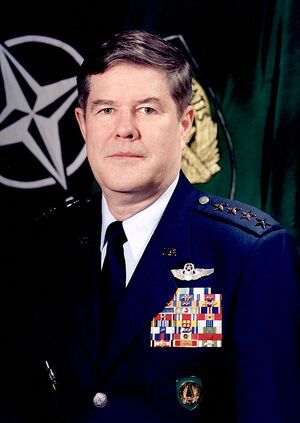Joseph Ralston
( officer) | |||||||||||||||||||||||||||
|---|---|---|---|---|---|---|---|---|---|---|---|---|---|---|---|---|---|---|---|---|---|---|---|---|---|---|---|
 | |||||||||||||||||||||||||||
| Born | November 4, 1943 Hopkinsville, Kentucky | ||||||||||||||||||||||||||
| Alma mater | Harvard/Kennedy School | ||||||||||||||||||||||||||
Supreme Allied Commander Europe and Military-industrial complex. "An arms merchant in diplomat's clothing."
| |||||||||||||||||||||||||||
General Joseph Wood Ralston[1] is currently the United States Special Envoy for countering the Kurdistan Workers Party (PKK) and holds senior positions in various defense related corporations. He was previously a career officer in the United States Air Force, and served as the fourth vice chairman of the Joint Chiefs of Staff (1996–2000) as well as Supreme Allied Commander for the North Atlantic Treaty Organization (NATO) in Europe (2000–2003). Unusual for a SAC, General Joseph Ralston is not known to have attended the Bilderberg.
Career
Military career
Ralston served in the United States Air Force from 1965 to 2003. He was in operational command at squadron, wing, numbered air force and major command, as well as various staff and management positions at every level of the United States Air Force.[2]
Ralston became Vice Chairman of the Joint Chiefs of Staff in 1996. He was favored to become Chairman of the Joint Chiefs of Staff in 1997. Following revelations of an extra-marital affair with a civilian employee of the Central Intelligence Agency in the 80s, he remained vice chairman until May 2000 when he was appointed Supreme Allied Commander for the North Atlantic Treaty Organization (NATO) in Europe.[3] He retired in March 2003 and joined the Board of Trustees of the Center for Strategic and International Studies.[4]
Bill Clinton writes in his memoirs My Life that Ralston was used to resolve a potentially sticky situation with Pakistan in which the US would use Pakistani airspace to strike at the Al-Qaeda organization meeting in Afghanistan following the US Embassy bombings in Kenya and Tanzania. There was US concern that Pakistan's intelligence services would tip off the targets or even worse assume the missiles over Pakistan came from India, potentially triggering a nuclear conflict on the Indian sub-continent. As Clinton writes on page 799 of My Life, "we decided to send the vice chairman of the Joint Chiefs of Staff, General Joe Ralston, to have dinner with the top Pakistani military commander at the time the attacks were scheduled. Ralston would tell him (the Pakistani general) what was happening a few minutes before our missiles invaded Pakistani airspace, too late to alert the Taliban or Al-Qaeda, but in time to avoid having them shot down or sparking a counterattack on India."
In September 2006, Ralston was assigned as Special Envoy for Countering the Kurdistan Workers Party (PKK) by the President of the United States George W. Bush.[5] The PKK is a Kurdish separatist group designated as a terrorist organization by the United States, Turkey and the European Union.
Ralston was one of at least three retired four-star generals asked by the Bush administration to oversee both wars in Iraq and Afghanistan. Ralston and the two other generals, however, all declined this position.[6]
Conflicts of interest
Ralston held various senior positions in defense and security-related corporations, simultaneously with his diplomatic role as "anti PKK coordinator". Critics said Ralston was using his influence as special envoy to secure large government weapons contracts for arms maker Lockheed Martin where he was on the board of directors. The Boston Globe described him as "an arms merchant in diplomat's clothing."[7]
In October 2006, the Kurdish National Congress of North America issued a press release demanding "the immediate resignation" of General Joseph Ralston:[8]
Ralston's appointment came at a time when Turkey was finalizing the sale of 30 new Lockheed Martin F-16 Fighting Falcon aircraft (approx. $3 billion) and as Turkey was due to make a decision on the $10 billion purchase of the new Lockheed Martin F-35 JSF aircraft. The sale for the F-16's was approved by the United States Congress in mid-October and Turkey's decision in favor of the F-35 JSF was announced on October 25, shortly after Ralston's recent stay in Ankara, ostensibly to counter the PKK.
Since the PKK insurgency began in 1983, 30,000 people have died and over 3,000 Kurdish villages have been destroyed, often by U.S. supplied planes.[9] Critics are concerned that hard line anti-PKK policies influenced by conflicting interests would compromise the prospects for longterm solution to the Kurdish-Turkish issue.[10]
On October 1, 2006, the PKK announced a unilateral cease-fire in south-east Turkey, a move that the Turkish government has rejected:[11]
The PKK had to stop fighting anyway because of the winter, but the PKK, backed by Iraqi Kurds, are acting as if this were a major political decision, not a move dictated by a practical necessity. Of course, we don't take it seriously.
Speaking before the Eurasian Strategic Research Center (ASAM) in Istanbul, Ralston mirrored the Turkish government's rhetoric :[12]
I want to be clear on this point: The US will not negotiate with the PKK. We will not ask Turkey to negotiate with the PKK. And I pledge to you that I will never meet with the PKK.
Bilderberg
- ↑ https://books.google.com/books?id=fYcZAAAAIAAJ&pg=PA483
- ↑ https://www.jcs.mil/Portals/36/Documents/History/Institutional/Chairmanship_of_the_JCS.pdf
- ↑ https://www.nytimes.com/1999/08/04/us/for-a-scandal-scarred-general-the-gleam-appears-to-be-back-on-the-brass.html
- ↑ https://www.upi.com/Top_News/2003/03/10/Retired-general-joins-CSIS/41951047334227/
- ↑ https://web.archive.org/web/20080109070316/http://www.state.gov/r/pa/ei/biog/75277.htm
- ↑ https://www.washingtonpost.com/wp-dyn/content/article/2007/04/10/AR2007041001776.html
- ↑ https://web.archive.org/web/20080511222348/http://www.boston.com/news/globe/editorial_opinion/oped/articles/2006/11/01/an_undiplomatic_conflict_of_interest/}
- ↑ https://web.archive.org/web/20070812173952/http://www.kncna.org/docs/pdf_files/KNC_PR_Demanding_Resign_of_JRalston.pdf
- ↑ https://web.archive.org/web/20080316140150/http://www.gnn.tv/threads/21762/Realism_Triumphant_Arming_the_Usual_Suspects_in_Turkey_and_India
- ↑ http://www.balkanalysis.com/2006/10/31/damage-control-firm-takes-quiet-interest-as-former-us-general-is-charged-with-turkish-profiteering/
- ↑ https://web.archive.org/web/20070930155228/http://www.turkishdailynews.com.tr/article.php?enewsid=59560
- ↑ https://web.archive.org/web/20070813144548/http://istanbul.usconsulate.gov/ralston_091906.html